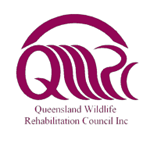
Queensland Wildlife Rehabilitation Council
How Can I Help
Only permitted wildlife rehabilitators are allowed to provide long term care for sick, injured or orphaned wildlife (see “How to become a wildlife rehabilitator” for further information).
Wildlife in distress should be taken to a local wildlife rehabilitator or a veterinarian for care and treatment. Contact a local wildlife rehabilitation group for help (view here) or call RSPCA Qld on 1300 ANIMAL (1300 264 625) for further assistance.
Here is how you can help
- Make sure you are safe.
- Only handle an injured animal if you know how to.
- Do not handle any bat (flying foxes or microbats) unless you have been trained and you have a current vaccination against Australian bat lyssavirus (ABL). Call a local care group or RSPCA Qld on 1300 ANIMAL (1300 264 625) immediately.
- Injured wild animals won’t want to be handled. They are likely to defend themselves and may try to escape. Handle them so that they won’t struggle and worsen their injury.
- If possible, remove the animal from the threat (e.g. take it off a road or out of a swimming pool).
- Wear gloves or use a thick towel (or jumper) to restrain the animal. This will protect you from scratches or bites.
- Put the animal in a warm, quiet, enclosed space as quickly as possible (e.g. wrap it in a towel and place it in a secure cardboard box). Make sure the container has adequate ventilation.
- The animal’s survival may depend on it being kept warm and quiet in the dark and away from children, domestic animals and noise. Avoid opening the container to look at the animal or to show it to others.
- Do not give sick, injured or orphaned animals anything to eat or drink.
- When transporting an injured animal, restrain the container inside a vehicle and cover it so that the animal can’t escape.
- Make sure you tell the wildlife carer or vet receiving the animal where you found the animal, so it can be released back to the same area when it has recovered. This information helps to identify and manage ‘black spots’—where significant numbers of sick or injured wild animals are being found
For assistance take the animal to the nearest vet, contact a local wildlife rehabilitation group for help (view here) or call RSPCA Qld on 1300 ANIMAL (1300 264 625).

